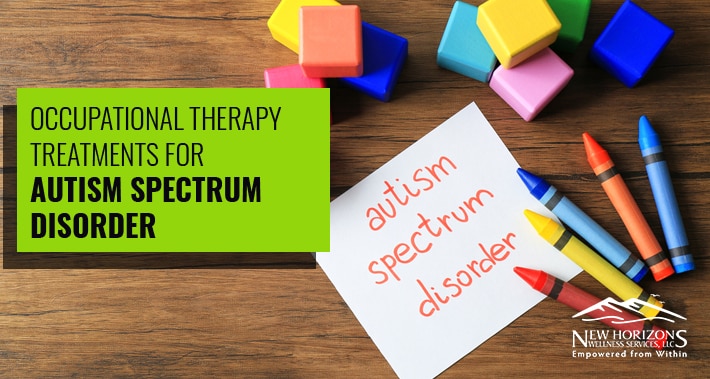
If your child has been diagnosed with autism, or you suspect they may be “on the spectrum”, as a parent you probably have a lot of questions. Every parent wants what’s best for their child, and then something comes to light which you weren’t expecting you may be left with a lot of questions. Will my child be able to live a “normal” life? How will this affect their development? or their ability to make friends? in what ways will this affect how they experience the world? Luckily, there is help.
We’re New Horizons Wellness Services, and we offer occupational therapy for autism spectrum disorder. Let’s have a closer look at what it means to have autism, the different ways people with autism experience the world, and some of the ways occupational therapy can help individuals with autism to develop the skills they need to help improve their lives.
What Is Autism Spectrum Disorder?
Autism Spectrum Disorder is a developmental disorder which affects the part of the brain which controls communication, emotions, and movement.
Symptoms usually showing up during the early years of life, and can range from mild to severe, including:
- Avoiding eye contact
- Not learning to speak at the same rate as their peers
- Easily being upset by small changes in routine
- Avoiding physical touch
- Poor social skills
If your child is exhibiting these signs, you may want to consider having an assessment done to determine if they fall somewhere on the autism spectrum.
How Do People Experience Autism?
People with autism often times don’t experience the world in the same way as those who don’t have it.
The Autistic Self Advocacy Network has outlined a number of ways in which individuals with autism may move through the world differently than individuals who are not on the spectrum.
Let’s have a look at some of the ways people with autism can experience things differently.
1. They Think Differently
Often known for being great problem solvers, people with autism are known for paying a lot of attention to detail, and often show great interest in things which others may not have interest in. However, they can become easily overwhelmed, and not respond well to changes in routine. Executive functioning tasks may be difficult, and they may struggle with decision making, starting or finishing tasks and may need longer to think things over.
2. They Process Their Senses Differently
Over stimulation from loud noises or bright lights can cause issues for people with autism, who are often extremely sensitive to these types of stimuli. They may not notice sensations such as pain or hunger in the same way as others and often use movements called “stimming” such as rocking or humming to help regulate their senses.
3. They Communicate Differently
People with autism will often repeat things they have heard, or write scripts in their head of things they want to say. Others who have little or no speech capabilities often use Augmentative and Alternative (AAC) forms of communication. This can include typing on a computer, or pointing to a picture or letter board.
4. They Move Differently
Coordination and fine motor skills can be difficult for individuals with autism. Issues with speech can often result from this, as it requires coordination. Speech may be difficult, and for those who do speak, things like regulating the volume of voice can be difficult.
5. They Socialize Differently
Following normalized and accepted social cues be difficult for individuals on the autism spectrum. Maintaining eye contact may be uncomfortable, and they are often more direct – even in situations where this would normally not be advisable. People with autism may have difficulty controlling facial expressions and body language, and often have trouble deciphering cues regarding how others are feeling. Despite not always being able to read these cues, autistic individuals are often hypersensitive to the feelings of others.

How Can An Occupational Therapist Help Autistic People?
Occupational therapy treatments can help autistic people in a couple of ways: evaluation and therapy.
If a parent has worries about their child’s development, an occupational therapist can help evaluate their development, and determine if they are developing at the same rate as their peers. Things which may be observed include:
- Attention span
- Need for personal space
- Posture, balance, and other motor skills
- Aggressive behavior
After observing and gathering information, an occupational therapist can create a specialized treatment plan, based on the needs of the child. Strategies may include activities such as:
- Ways to cope with transitions
- Brushing teeth and hair, and other developmental activities
- Activities to developing communication skills
- Physical activities to develop coordination such as stringing beads
These types of therapies can help improve the quality of life for individuals with autism and help to develop motor skills, daily living skills, self regulation skills and perceptual skills.
Book An Appointment With New Horizons Wellness Services
Are you worried your child isn’t developing at the same rate as their peers? Do you suspect signs of autism spectrum disorder and want to seek a diagnosis? Or perhaps your child has been diagnoses with autism spectrum disorder and are looking for a treatment plan to help them to develop social skill which will help make life easier. We’re New Horizons Wellness Service and we can help.
Contact us today to learn more about our services, and set up an appointment.

Yours in Health,
New Horizons Wellness Services13333 SW 68th Pkwy,
Tigard, OR 97223
- https://g.page/newhws
New Horizons Wellness Services provides a true multidisciplinary approach to mental & physical health treatments for children, adults and families.